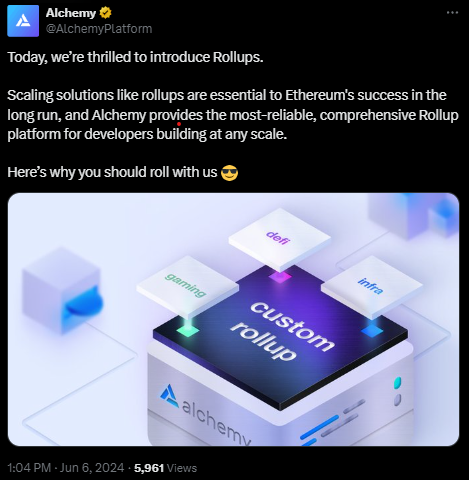Alchemy, a prominent blockchain infrastructure designer, has recently introduced a development kit specifically focused on rollup technology, representing a significant advancement within the cryptocurrency ecosystem.
Dubbed Alchemy Rollups, this new offering provides developers with a comprehensive toolkit designed for creating, optimizing, and launching layer-2 blockchain solutions, with a special emphasis on scalability, speed, and cost-efficiency.
Simplifying Rollup Development with Battle-Tested Infrastructure
Monica Garde, the product lead at Alchemy, highlighted the strength of their infrastructure, which supports some of the most trusted networks in decentralized finance (DeFi).
She articulated the complexities involved in operating a node effectively at scale, a challenge that Alchemy Rollups seeks to address. The initial release will support integrations with popular frameworks such as Arbitrum Orbit and Optimism Stack, enabling developers to utilize zero-knowledge proofs or optimistic rollup systems.

Garde revealed plans to explore zero-knowledge frameworks later in the year, indicating a commitment to broadening the scope of rollup technology. She also pointed out the economic advantages of layer-2 networks over Ethereum’s mainnet, especially given Ethereum’s dominance as a DeFi hub with over $66.9 billion in total value locked.
Despite Ethereum’s central role, the high cost of transactions on its mainnet has spurred interest in layer-2 solutions that offer reduced costs without sacrificing security or trust within the industry.
Rollups: A Scalable and Secure Solution
Rollups are a form of blockchain technology that boosts scalability and speed by bundling multiple transactions into a single batch, which is subsequently recorded on the blockchain.
This process allows for the handling of numerous transactions per second while maintaining the blockchain’s inherent security and decentralization. Users benefit from shared transaction fees and lower overall costs, making Ethereum usage more economical.
This technology not only aids high-throughput networks like Ethereum, notorious for high gas fees during peak activity, but also improves the experience for users and developers, potentially attracting more participants to the network.
Rollups are poised to play a critical role until the launch of Ethereum 2.0 and the implementation of sharding technologies. The implications of rollups extend beyond just improving transaction speeds; they are pivotal in decentralized finance, NFT markets, and blockchain gaming.
Regarded as robust scaling solutions, rollups could significantly contribute to the development of a decentralized internet, or Web3, a major step forward from merely scaling an individual blockchain.
As the demand for more efficient core blockchains continues to grow, numerous projects are closely monitoring developments in rollup technology. For instance, GTON Capital is incorporating it into its Web3 infrastructure to facilitate a decentralized stablecoin, which will serve as the gas currency.
- Crypto Price Update July 24: BTC Maintains $66K, ETH at $3.4K, XRP, TON, and ADA Rallies
- Bitcoin Falls to $65K as Mt. Gox Transfers $2.8 Billion BTC to External Wallet
- News of Marathon Digital’s $138 Million Fine for Breach of Non-Disclosure Agreement Triggers a Bearish 2.5% of Its MARA Stock
- Are $530M Bitcoin ETF Inflows a Blessing or Caution?
- Metaplanet Teams with Hoseki for Real-Time Bitcoin Holdings Verification
- Building Secure Blockchain Systems: An Exclusive Interview with ARPA and Bella Protocol CEO Felix Xu
- Building The “De-Facto Crypto Trading Terminal”: An Exclusive Interview with Aurox CEO Giorgi Khazaradze
- Building a New Global Financial System: An Exclusive Interview With Tyler Wallace, Analytics Head at TrustToken
- “Solana is the Promised Land for Blockchain” — An Exclusive Interview with Solend Founder Rooter
- El Salvador: Where The Bitcoin Revolution Begins With A Legal Tender

 Why Trust Us
Why Trust Us







